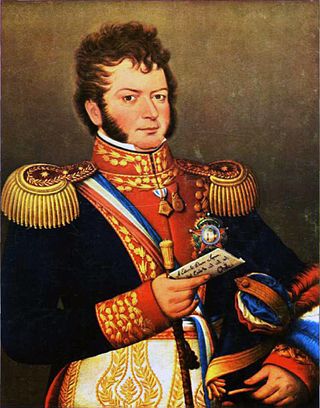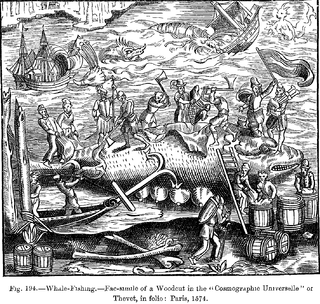Background
During the entire colonial period, Spain maintained a very strict monopoly on international commerce with its American Empire. In 1808, the British whaling ship Scorpion , under the command of Captain Tristan Bunker, arrived at the Chilean coast with the stated purpose of whaling. The real purpose of the trip was to smuggle into the colony a very valuable consignment of British cloth that the ship was carrying in its hull. To this purpose, Captain Bunker contacted Henry Faulkner, an American medical doctor then living in the city of Quillota.
The Scorpion was just one of many ships trading contraband English fabrics on the Pacific coast. In 1807 the British Government, at the urging of the parliamentarian William Jacob, had modified the monopoly of the South Sea Company so that vessels were permitted to enter the Pacific Ocean via Cape Horn. This incentive had been created as part of Britain's goal of challenging Spain's dominance of Central and South America. The short but failed invasion of the Rio de Plata in 1806-1807 had encouraged this approach.
Captain Bunker, though commanding a British merchant sailing ship, was a North American, born and raised on Nantucket Island, Massachusetts. Many Nantucket whaling families had relocated to Britain in the 1790s at the urging of the English government and William Rotch to establish a whale oil industry. Pacific Ocean whaling was then known as the Southern Fishery.
Faulkner and Bunker reached an agreement, and the captain was to deliver the goods at the Topocalma Hacienda that was owned by one José Fuenzalida. The agreed price was 80,000 pesos of the time, a small fortune. Don Francisco Antonio de la Carrera, Royal Delegate of Colchagua, with jurisdiction over Topocalma, got wind of the scheme and decided to intervene.
Fuenzalida, De la Carrera and Faulkner conspired together and decided to hijack the cargo. To achieve their plans they needed enough force to strongarm Captain Bunker and his crew. To that purpose, they contacted Royal Governor Francisco Antonio García Carrasco. The Governor and his secretary, Juan Martínez de Rozas, agreed to provide a squadron of Dragones (police) in exchange for 85% of the profits, and of course without notification to the Royal Customs Office.
On September 25, 1808, at Topocalma Bay, three conspirators (the butler of the Marquis of Larraín, the representative of De la Carrera and Dr. Faulkner) boarded the Scorpion to finalize the deal. The payment was to be made in copper ingots. While the representatives held their talks with the captain, the copper was loaded by Dragones disguised as porters.
After the copper was loaded, the captain and eight of his sailors were invited to a banquet on shore, at the hacienda houses. During the meal, after a prearranged signal, Captain Bunker and his sailors were shot and murdered. Then the Dragones boarded and proceeded to take over the frigate and its cargo.
Aftermath and importance
The facts came to light very quickly afterwards, and caused a very violent reaction. The populace tried to lynch all the participants, who were miraculously saved by being arrested and put under permanent armed guard. In Santiago all the anger was directed against Governor García Carrasco and his secretary Martínez de Rozas; both men in a very short time accumulated a large number of legal suits against them, while public riots erupted. Martínez de Rozas had to resign and hide in Concepción.
The subsequent investigation destroyed what little authority the governor had left, and less than a year later required his surrender of the post to Mateo de Toro Zambrano, giving way to the first Chilean attempt at self-government.
The events that the Scorpion participated in took many decades to resolve. The English firm of Hullett successfully sued the King of Spain for financial losses. The case was finally resolved in the Privy Council in the 1830s.

Bernardo O'Higgins Riquelme was a Chilean independence leader who freed Chile from Spanish rule in the Chilean War of Independence. He was a wealthy landowner of Basque-Spanish and Irish ancestry. Although he was the second Supreme Director of Chile (1817–1823), he is considered one of Chile's founding fathers, as he was the first holder of this title to head a fully independent Chilean state.

Ramón Freire Serrano was a Chilean political figure. He was head of state on several occasions, and enjoyed a numerous following until the War of the Confederation. Ramón Freire was one of the principal leaders of the liberal Pipiolo movement. He has been praised by historian Gabriel Salazar as the most democratic leader of the early republican period in Chile.

This article discusses the history of whaling from prehistoric times up to the commencement of the International Whaling Commission (IWC) moratorium on commercial whaling in 1986. Whaling has been an important subsistence and economic activity in multiple regions throughout human history. Commercial whaling dramatically reduced in importance during the 19th century due to the development of alternatives to whale oil for lighting, and the collapse in whale populations. Nevertheless, some nations continue to hunt whales even today.

Juan Martínez de Rozas Correa was a Chilean lawyer and politician, he was also the first leader in the Chilean fight for independence.

The Royal Governor of Chile ruled over the Spanish colonial administrative district called the Captaincy General of Chile, and as a result the Royal Governor also held the title of a Captain General. There were 66 such governors or captains during the Spanish conquest and the later periods of Spanish-centered colonialism. Since the first Spanish–Mapuche parliaments in the 17th century it became an almost mandatory tradition for each governor to arrange a parliament with the Mapuches.

The Battle of Valparaíso, also called the Capture of USS Essex, was a naval action fought during the War of 1812. It took place off Valparaíso, Chile on March 28, 1814 between the frigate USS Essex and the sloop USS Essex Junior of the United States Navy and the frigate HMS Phoebe and sloop HMS Cherub of the Royal Navy. The British ships won the battle, and the American vessels were captured.

The Chilean War of Independence was a military and political event that allowed the emancipation of Chile from the Spanish Monarchy, ending the colonial period and initiating the formation of an independent republic.

Francisco Antonio García Carrasco Díaz was a Spanish soldier and Royal Governor of Chile. His political relations with Juan Martinez de Rozas and a smuggling scandal involving the frigate Scorpion destroyed what little authority he had, and required that he surrender his post to Mateo de Toro Zambrano President of the first govermennt board. He was the last governor to rule before the Chilean independence movement swept the country.

Brigadier Juan Mackenna was an Irish-born, Chilean military officer and hero of the Chilean War of Independence. He is considered to have been the creator of the Corps of Military Engineers of the Chilean Army.

Government Assembly of the Kingdom of Chile, also known as the First Government Gathering, was the organization established to rule post-colonial Chile following the deposition and imprisonment of King Ferdinand VII of Spain by Napoleon Bonaparte. It was the earliest step in the Chilean struggle for independence, and the anniversary of its establishment is celebrated as the national day of Chile.
The Figueroa mutiny was a failed attempt on April 1, 1811 to restore royal power in Chile and the first coup d'état in Chile.
Samuel Enderby & Sons was a whaling and sealing company based in London, England, founded circa 1775 by Samuel Enderby (1717–1797). The company was significant in the history of whaling in the United Kingdom, not least for encouraging their captains to combine exploration with their business activities, and sponsored several of the earliest expeditions to the subantarctic, Southern Ocean and Antarctica itself.

Eber Bunker (1761–1836) was a sea captain and pastoralist, and he was born on 7 March 1761 at Plymouth, Massachusetts. He commanded one of the first vessels to go whaling and sealing off the coast of Australia. His parents were James Bunker and his wife Hannah, née Shurtleff.
James Colnett was an officer of the British Royal Navy, an explorer, and a maritime fur trader. He served under James Cook during Cook's second voyage of exploration. Later he led two private trading expeditions that involved collecting sea otter pelts in the Pacific Northwest of North America and selling them in Canton, China, where the British East India Company maintained a trading post. Wintering in the recently discovered Hawaiian Islands was a key component of the new trade system. Colnett is remembered largely for his involvement in the Nootka Crisis of 1789—initially a dispute between British traders and the Spanish Navy over the use of Nootka Sound on Vancouver Island that became an international crisis that led Britain and Spain to the brink of war before being peacefully resolved through diplomacy and the signing of the Nootka Conventions.

The history of Pichilemu began around the 16th century, when Promaucaes inhabited the modern Pichilemu region. According to Chilean historiographer José Toribio Medina on his book Los Restos Indígenas de Pichilemu (1908), Spanish conqueror Pedro de Valdivia gave Topocalma encomienda, in which Pichilemu was supposed to be, to Juan Gómez de Almagro, on January 24, 1544.
The following lists events that happened during 1813 in Chile.
Ganges was a ship launched in 1798 at Philadelphia, probably for French owners. During the Peace of Amiens her registration and homeport became Dunkirk. Her French owners sent her to engage in whaling at Delagoa Bay, where the British letter of marque whaler Scorpion captured her in 1803. She then made one whaling voyage to Isle of Desolation before a French squadron captured her in 1806 during a second whaling voyage. Accounts differ as to whether her captors sank her, or released her and she continued to operate as a merchant vessel until 1814.
Montezuma was launched in Philadelphia in 1804. She came into British hands c.1807 after having been seized for attempting to evade the British East India Company's monopoly on British trade with India. She then initially traded with Charleston until 1811 when she went whaling in the Galápagos Islands. There the Americans captured her in 1813. Her captors sailed her to Valparaiso where the Spanish colonial government seized her.
The battle of Río Bueno was fought in 1654 between the Spanish Army of Arauco and indigenous Cuncos and Huilliches of Fütawillimapu in southern Chile. The battle took place against a background of a long-running enmity between the Cuncos and Spanish, dating back to the destruction of Osorno in 1603. More immediate causes were the killing of Spanish shipwreck survivors and looting of the cargo by Cuncos, which led to Spanish desires for a punishment, combined with the prospects of lucrative slave raiding.
Venus was launched at Deptford in 1788 and made 15 voyages as a whaler in the British southern whale fishery. Of 812 whalers in the British southern Whale Fishery database for which there was data, she had the fifth highest number of whaling voyages. She was last listed in 1823.











